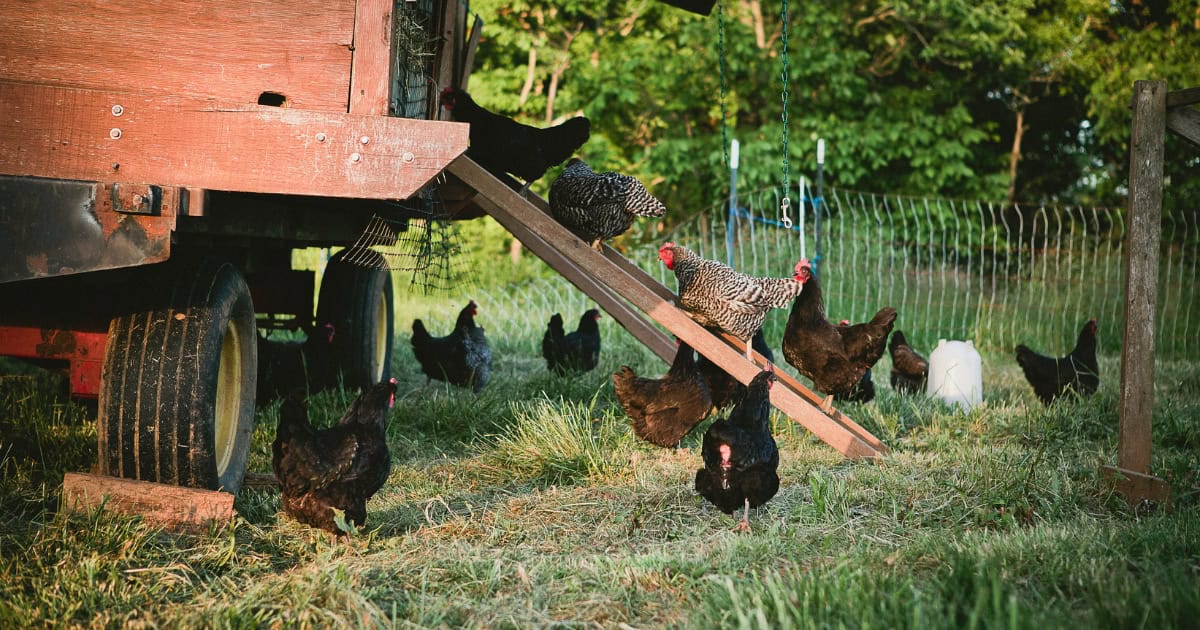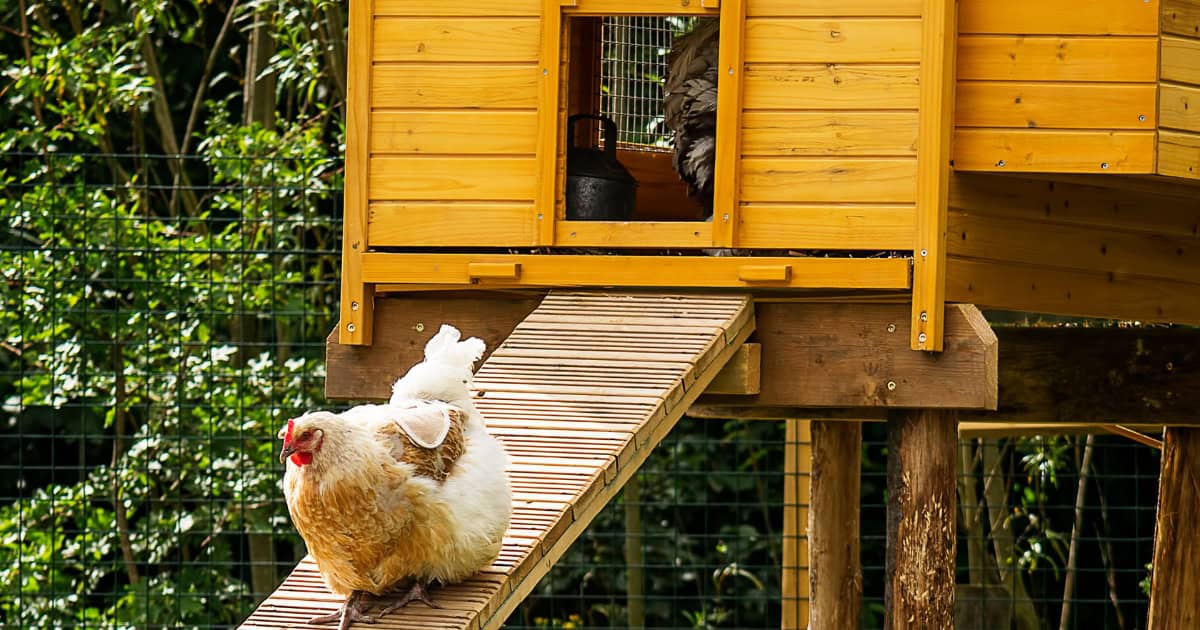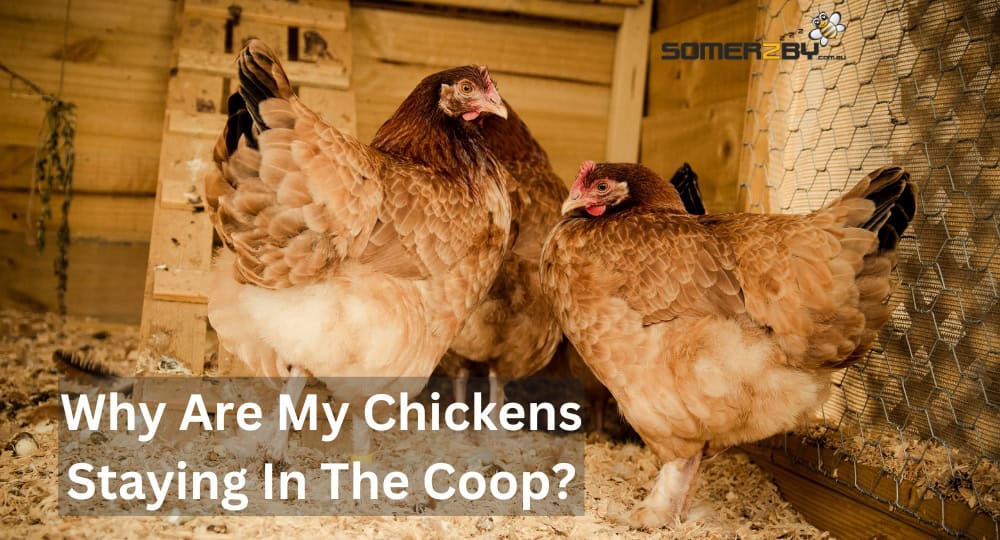If you have ever found yourself asking “Why Are My Chickens Staying in the Coop?” you’re in the right place! Today, we’re diving into why chickens might be suddenly refusing to leave the comfort of their coop.
We’ll explore some of the common reasons your chickens might be staying inside their coop, from safety concerns to environmental factors affecting their comfort levels.
We will also offer you practical advice on encouraging them to exit their coop and addressing health concerns linked with reduced outdoor activity among chickens.
Common Reasons Chickens Stay Inside the Coop
Ever wondered why your chickens prefer their coop to the great outdoors? At first glance, opting for the homeliness of their coop over the big wide world might appear simply as a comfort choice, yet there are many other reasons why.
Let’s explore some of them.
Predator Threats
Chickens, naturally cautious, may hesitate to roam freely due to the looming presence of predators. Whether it’s a fox in the bush or a hawk overhead, these threats can cause stress and fear among your flock.
Creating a secure environment such as an enclosed run area is key to encouraging exploration outside the hen house.
Adverse Weather Conditions
Just like us, chickens aren’t fans of bad weather. Extreme temperatures—be it too hot or too cold—can deter them from leaving the comfort of their shelter.
This behaviour is typical for chickens, and they usually resume venturing outside once the weather conditions improve. Check out our guide on creating a comfortable chicken coop setup.
Broody Hens
If your chicken seems reluctant to leave its coop, it could be exhibiting broody behaviour. Broody hens become intensely focused on hatching eggs, spending long periods on their nest.
They may even refuse to leave their nesting boxes for food or water, exhibiting signs of aggression if disturbed. Providing nesting boxes in a quiet area can help satisfy their instincts and encourage them to return to their normal routine once their brooding cycle is complete.
Illness or Injury
Chickens may stay inside their coop if they’re sick or injured. Sick or injured chickens sleep to aid in recovery, so they may choose to rest indoors. Monitor their condition closely and consult with a veterinarian if their health does not improve.
Additionally, consider separating them from the rest of the flock to prevent further stress or injury. This is particularly important in instances of common infestations such as red mites, which have the potential to rapidly spread among the entire flock.
Changes In Routine or Environment
Chickens are creatures of habit, and disruptions to their familiar environment or social dynamics can induce stress and anxiety. Any sudden changes, such as the introduction of new flock members or alterations to the chicken coop’s layout, can significantly impact a chicken’s behaviour.
Inadequate Outdoor Space
If the outdoor area doesn’t meet their needs or seems uninviting, chickens might choose indoors over outdoors. Enriching their external environment with engaging elements such as dust baths, perches, and varied terrain encourages natural behaviours and outdoor activity.
Somerzby have this informative guide about ‘How Much Space Does a Chicken Need?’ to help you understand your chicken’s space requirements.
Flock Bullying
Flock bullying, often driven by the establishment of a pecking order, may cause chooks to experience heightened stress, anxiety, and fear, leading them to seek refuge in the coop where they feel safe.
This behaviour can disrupt their normal routine and limit their access to essential resources such as food, water, and foraging.
Coop Setup
If the coop has only one or a few small doors, chickens may find it too tiresome to exit, particularly if their requirements are already fulfilled indoors.
Additionally, if there are no perceived benefits beyond the coop’s confines, chickens may prefer to stay inside. Coops And Cages have this helpful guide on ‘What do chickens need in a coop’.
Age
Age can influence whether chickens prefer to stay inside their chicken coops or not; older chickens tend to be more inclined to stay indoors, seeking the safety and comfort of familiar surroundings, while young chickens are often more adventurous and eager to explore outside.

Enhancing Outdoor Appeal for Chickens
Enhancing your backyard to make it more inviting for chickens to free range in will inspire them to venture out and indulge in their instinctual activities such as scavenging,
Different textures and heights in landscaping mimic a chicken’s natural environment. Incorporate patches of grass, areas with sand or dirt for dust baths, and safe plants they can nibble on.
Consider planting some chicken-friendly vegetation such as clover or dandelions which are both nutritious and loved by chickens.
Addressing Health Concerns Linked to Reduced Outdoor Activity
Chickens that spend too much time inside their coop might face several health problems, from poor physical condition to behavioural problems. A diet limited by what is available inside a coop can lead to nutritional deficiencies as well as reduced egg production.
When chickens roam freely outside, they peck at a wide assortment of nutrients that are vital to their well-being.

FAQ’s About Why Are My Chickens Staying In The Coop
Is it normal for chickens to spend a lot of time in the coop?
While chickens may spend a lot of time in their coop, excessive confinement could signal stress or health concerns, warranting further attention.
How can I encourage my chickens to spend more time outside?
Provide enticing outdoor areas for foraging, dust bathing, and exploration, ensuring access to fresh water and shade.
How can I tell if my chickens are stressed or uncomfortable?
Signs that your chickens may be stressed or uncomfortable include decreased egg production, feather pecking, aggression, lethargy, reduced weight loss, and changes in their behaviour, such as pacing or hiding.
Toni’s Wrap
In conclusion, unravelling the mystery behind “Why Are My Chickens Staying in the Coop?” sheds light on the factors influencing your chickens to stay in their coop.
Our journey of discovery reveals that things such as illness or injury, flock bullying, changes in environment, or predator threats can result in your chickens staying inside their coop.
Remember, a happy chicken is one that feels safe yet curious enough to explore outside. Ensuring their home base is secure and inviting while making the great outdoors appealing can make all the difference.
By carefully watching their habits and taking care of any underlying issues, chicken owners can create a welcoming outside environment that encourages their feathered friends to step outside their coop door and explore the outside world, boosting their overall well-being and joy.




